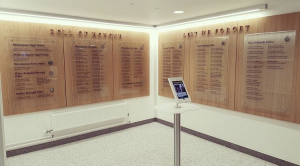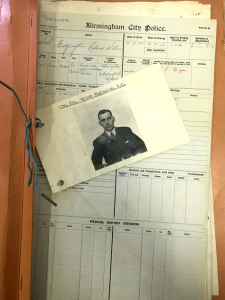Jack Scates has written the following post describing the work he did as part of the School’s Professional Skills Module. This module is an option which gives our students the chance to do work placements and build employability while using their skills as historians too.
In September 1944, a few months after the Allied landings at Normandy, Richard Edgington and thousands of other soldiers in the 1st Airborne Division parachuted into the Nazi-occupied Netherlands. Their mission was to secure the bridges that would allow Allied forces to push past the Siegfried Line defences and into Germany itself. But the British plan didn’t work out as Fieldmarshal Montgomery had hoped. The paratroopers didn’t get the support they expected on the ground, and most of them ended up captured by the enemy. Severely injured, Richard Edgington made it out. Many of his comrades did not.

Two years later, Edgington had made a full recovery. With the war over, he decided to find another way to serve, and to make use of the bravery he had shown at the Battle of Arnhem. Edgington joined the Birmingham City Police (which became the West Midlands Police in 1974). In the first week of training, the newly-minted PC Edginton performed well. “I am sure he would have succeeded in his endeavour to make the police force his career,” wrote his training officer. But once again, fate interfered with the best-laid plans. Seven days after he joined the police, Edgington died of a perforated ulcer in his small intestine.
Uncovering this story was not exactly what I thought I would be doing when I started my work placement at the West Midlands Police Museum last autumn. I knew that I would be helping to digitise the vast—and, yes, incredibly dusty—police summary records held at the museum, which contain the personal information of the force’s former officers. PC Edginton’s summary record, though, told only a small part of the story. Why had a new officer died after just a week in service? To piece things together, I had to comb the archives for the police order book, and Edgington’s personnel file, including the coroner’s report on his death.

It was the research and problem-solving skills I have developed as a history student here at Birmingham that enabled me to find the answers I was looking for. And at the same time, working with the museum gave me the opportunity to put those skills into practise in a way you can’t achieve on an ordinary module. The Professional Skills module helped me realise how valuable the skills of careful and critical analysis can be, not just in writing assessed essays, but in the world beyond campus as well. My work made a lasting difference to me, and to the museum as well. He may have only been a policeman for a week, but as a result of my research, Richard Edgington has now been added to the West Midlands Police roll of honour, commemorating those who died in service to the city.
